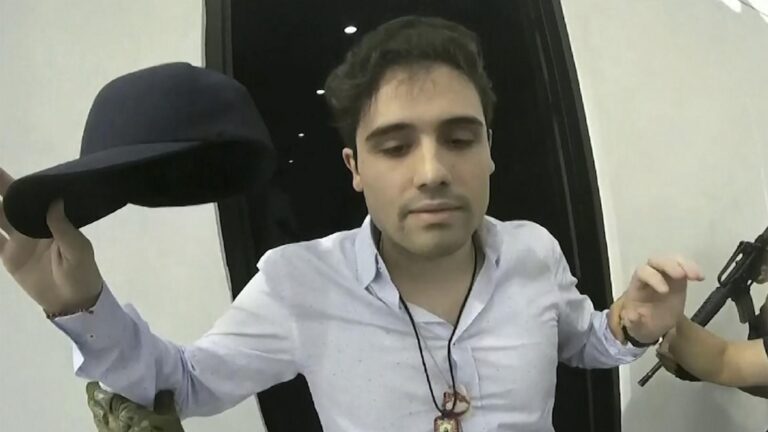Ovidio Guzmán Enters Guilty Plea in Landmark Chicago Federal Case
Ovidio Guzmán, son of the notorious JoaquĂn “El Chapo” Guzmán, has formally admitted guilt in a Chicago federal court, signaling a major breakthrough in the fight against international narcotics trafficking. This admission highlights his direct involvement in the operations of the Sinaloa cartel, one of the most powerful drug trafficking organizations globally. The plea is anticipated to influence ongoing investigations and prosecutions targeting cartel activities across North America, reinforcing U.S. efforts to dismantle these criminal enterprises.
During the proceedings, prosecutors detailed Guzmán’s extensive role, which included:
- Overseeing the logistics of large-scale drug shipments into the United States
- Directing enforcement squads responsible for cartel security and intimidation
- Managing complex financial networks that laundered proceeds across continents
| Charge | Maximum Sentence | Status Post-Plea |
|---|---|---|
| Drug Trafficking | Up to 40 years imprisonment | Plea of Guilty Entered |
| Money Laundering | Up to 20 years imprisonment | Plea of Guilty Entered |
| Conspiracy | Up to 10 years imprisonment | Plea of Guilty Entered |
Impact on U.S.-Mexico Collaboration in Drug Enforcement
The guilty plea by Ovidio Guzmán represents a critical juncture in the evolving partnership between the United States and Mexico in combating transnational crime. This development is expected to enhance bilateral cooperation by streamlining extradition procedures and fostering more robust intelligence exchanges. Both governments face ongoing challenges in addressing the multifaceted nature of cartel operations, and this case may serve as a catalyst for deeper judicial and law enforcement integration.
Notable legal and diplomatic consequences include:
- Acceleration of extradition processes to facilitate timely prosecutions
- Strengthened collaboration between U.S. and Mexican law enforcement agencies
- Heightened expectations for Mexico to intensify internal efforts against cartel factions
- A strategic shift in U.S. policy focusing on prosecuting cartel leadership rather than lower-tier operatives
| Dimension | Potential Outcome |
|---|---|
| Judicial Cooperation | Enhanced coordination and evidence sharing between courts |
| Diplomatic Relations | Improved trust amid ongoing security challenges |
| Cartel Power Structure | Disruption of leadership with risks of internal power struggles |
| Drug Supply Chains | Temporary disruption in narcotics flow |
Key Evidence Behind Ovidio Guzmán’s Conviction
Federal prosecutors built a robust case against Guzmán, leveraging a combination of intercepted communications, financial audits, and insider testimonies. Wiretap recordings played a pivotal role, capturing conversations that directly linked Guzmán to the orchestration of drug shipments and cartel financial management. Forensic accounting traced millions of dollars through a labyrinth of shell corporations, exposing complex money laundering operations.
Essential evidence components included:
- Recorded phone calls detailing cartel directives and meetings
- Confiscated narcotics traced through chemical fingerprinting to Guzmán-controlled routes
- Statements from cooperating former cartel members confirming Guzmán’s leadership role
- Surveillance data documenting Guzmán’s movements and contacts
| Evidence Type | Origin | Significance |
|---|---|---|
| Wiretap Recordings | Federal law enforcement agencies | Confirmed direct involvement in cartel operations |
| Financial Documentation | Banking and financial institutions | Revealed money laundering networks |
| Witness Testimonies | Turncoat cartel affiliates | Provided insight into cartel hierarchy and decision-making |
Strategies to Bolster Cross-Border Crime Prevention
To effectively combat transnational criminal organizations, it is imperative to deepen cooperation among international law enforcement bodies. Creating integrated task forces that facilitate real-time intelligence sharing and joint operations can close jurisdictional loopholes exploited by traffickers.Aligning legal frameworks and expediting extradition agreements will further streamline prosecution efforts and reduce safe havens for criminals. Additionally, investing in cutting-edge data analytics and communication technologies will enable authorities to anticipate and counter emerging threats more efficiently.
Public-private collaborations should be expanded to enhance border security infrastructure and deploy advanced surveillance systems. Training programs emphasizing cultural awareness and legal harmonization will improve interagency coordination across nations. The following table outlines core strategic pillars essential for strengthening cross-border crime prevention:
| Strategic Pillar | Focus Area | Anticipated Benefit |
|---|---|---|
| Intelligence Integration | Unified databases and seamless communication channels | Accelerated detection of criminal networks |
| Legal Alignment | Standardized laws and streamlined extradition processes | Reduced delays in judicial proceedings |
| Technological Advancement | Enhanced surveillance tools and predictive analytics | Proactive interception of illicit activities |
| Cross-Agency Training | Cultural competency and legal education programs | Improved operational synergy |
Final Thoughts on Guzmán’s Plea and Its Broader Implications
Ovidio Guzmán’s guilty plea represents a watershed moment in the ongoing campaign to dismantle the Sinaloa cartel’s extensive drug trafficking network. This case not only highlights the complexities of prosecuting transnational organized crime but also reinforces the necessity of enhanced cooperation between the United States and Mexico. As the judicial process advances, stakeholders anticipate further developments that could reshape strategies for combating narcotics trafficking and improving regional security.





